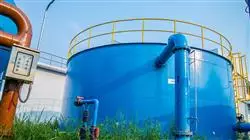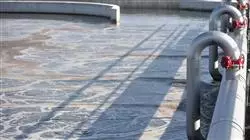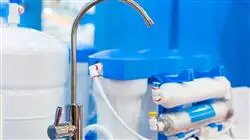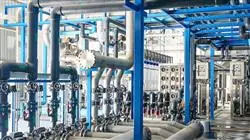University certificate
The world's largest faculty of engineering”
Introduction to the Program
A comprehensive and multidisciplinary training course that will allow you to excel in your career, following the latest advances in Water Treatment"

The Postgraduate diploma in Water Treatment has been designed to train the professional in this sector with the latest developments in the field. Thus, experts will learn about its properties, both physical and chemical, its structure and types of bonds, as well as the chemical reactions in which it plays an essential role in the life cycle and the different water purification processes.
On the other hand, wastewater treatment is key in the field of water engineering, since it is necessary to treat the water used to reduce the environmental impact derived from its use. The purpose of a wastewater treatment plant (WWTP) is to remove pollutants from wastewater in order to return the water to its source without the presence of pollutants. For this reason, this course is focused on the study of the processes and equipment associated with a wastewater treatment plant from a chemical engineering point of view.
This very complete training course covers the types of contamination, drinking water treatment plants (DWTP), their operation and the different processes carried out, with special emphasis on the most important ones in this process, such as flocculation, coagulation, purification and disinfection.
Upon completion of this Postgraduate diploma the skills acquired by the student will enable him/her to understand the importance of water treatment, the drinking water treatment plants that process water for use and consumption in daily life and in the industrial sector, as well as to understand the methods of analysis, management and economics involved in the drinking water treatment process for the production of drinking water.
It should be noted that since it is a 100% online Postgraduate diploma, the student is not conditioned by fixed schedules or the need to move to another physical location, but can access the contents at any time of the day, balancing their work or personal life with their academic life.
Don't miss the opportunity to take this Postgraduate diploma in Water Treatmentwith us. It's the perfect opportunity to advance your career"
This Postgraduate diploma in Water Treatment contains the most complete and up to date educational program on the market. The most important features of the program include:
- The development of case studies presented by experts in water treatment
- The graphic, schematic, and eminently practical contents with which they are created provide scientific and practical information on the disciplines that are essential for professional practice
- Practical exercises where the self-assessment process can be carried out to improve learning
- Special emphasis on innovative methodologies in Water Treatment
- Theoretical lessons, questions to the expert, debate forums on controversial topics, and individual reflection assignments
- Content that is accessible from any fixed or portable device with an Internet connection
This Postgraduate diploma is the best investment you can make in selecting a refresher program to update your knowledge in Water Treatment"
Its teaching staff includes professionals belonging to the field of water treatment, who bring to this training the experience of their work, as well as recognized specialists from leading companies and prestigious universities.
The multimedia content, developed with the latest educational technology, will provide the professional with situated and contextual learning, i.e., a simulated environment that will provide immersive training programmed to train in real situations.
This program is designed around Problem Based Learning, whereby the professional must try to solve the different professional practice situations that arise during the academic year. For this purpose, the professional will be assisted by an innovative interactive video system developed by renowned and experienced water treatment experts.
This training comes with the best didactic material, providing you with a contextual approach that will facilitate your learning"

This 100% online Postgraduate diploma will allow you to combine your studies with your professional work. You choose where and when to train"
Syllabus
The structure of the contents has been designed by the best professionals in the Water Treatment sector, with extensive experience and recognized prestige in the profession.

We have the most complete and up-to-date academic program in the market. We strive for excellence and for you to achieve it too"
Module 1. Water Chemistry
1.1. Water Chemistry
1.1.1. Alchemy
1.1.2. Evolution of Chemistry
1.2. The Water Molecule
1.2.1. Crystallography
1.2.2. Crystalline Structure of Water
1.2.3. Aggregation States
1.2.4. Links and Properties
1.3. Physical and Chemical Properties of Water
1.3.1. Physical Properties of Water
1.3.2. Chemical Properties of Water
1.4. Water as a Solvent
1.4.1. Ion Solubility
1.4.2. Solubility of Neutral Molecules
1.4.3. Hydrophilic and Hydrophobic Interactions
1.5. Organic Water Chemistry
1.5.1. The Water Molecule in Organic Reactions
1.5.2. Hydration Reactions
1.5.3. Hydrolysis Reactions
1.5.4. Hydrolysis of Amides and Esters
1.5.5. Other Water Reactions. Enzymatic Hydrolysis
1.6. Inorganic Water Chemistry
1.6.1. Hydrogen Reactions
1.6.2. Oxygen Reactions
1.6.3. Reactions to Obtain Hydroxides
1.6.4. Reactions to Obtain Acids
1.6.5. Reactions to Obtain Salts
1.7. Analytical Chemistry of Water
1.7.1. Analytical Techniques
1.7.2. Water Analysis
1.8. Thermodynamics of Water Phases
1.8.1. Laws of Thermodynamics
1.8.2. Phase Diagram. Phase Equilibrium
1.8.3. Water Triple Point
1.9. Water Quality
1.9.1. Organoleptic Characteristics
1.9.2. Physical-chemical Characteristics
1.9.3. Anions and Cations
1.9.4. Undesirable Components
1.9.5. Toxic Components
1.9.6. Radioactivity
1.10. Chemical Water Purification Processes
1.10.1. Water Demineralization
1.10.2. Reverse Osmosis
1.10.3. Decalcification
1.10.4. Distillation
1.10.5. Ozone and UV Disinfection
1.10.6. Filtration
Module 2. Waste from Water Treatment
2.1. Water Pollution Assessment
2.1.1. Water Transparency
2.1.2. Water Contamination
2.1.3. Effects of Water Contamination
2.1.4. Contamination Parameters
2.2. Sample Collection
2.2.1. Collection Procedure and Conditions
2.2.2. Sample Size
2.2.3. Sampling Frequency
2.2.4. Sampling Program
2.3. EDAR. Pretreatment
2.3.1. Receipt of Water
2.3.2. Dimensioning
2.3.3. Physical Processes
2.4. EDAR. Primary Treatment
2.4.1. Sedimentation
2.4.2. Flocculation-Coagulation
2.4.3. Types of Decanters
2.4.4. Decanter Design
2.5. EDAR. Secondary Treatment (I)
2.5.1. Biological Processes
2.5.2. Factors Affecting the Biological Process
2.5.3. Active Sludge
2.5.4. Percolating Sludge
2.5.5. Rotary Biological Contact Reactor
2.6. EDAR. Secondary Treatment (II)
2.6.1. Biofilters
2.6.2. Digesters
2.6.3. Agitation Systems
2.6.4. Aerobic Digesters: Perfect Mixing and Piston Flow
2.6.5. Active Sludge Digester
2.6.6. Secondary Decanter
2.6.7. Active Sludge Systems
2.7. Tertiary Treatment (I)
2.7.1. Nitrogen Removal
2.7.2. Phosphorus Removal
2.7.3. Membrane Technology
2.7.4. Oxidation Technologies Applied to Waste Generated
2.7.5. Disinfection
2.8. Tertiary Treatment (II)
2.8.1. Adsorption with Activated Carbon
2.8.2. Steam or Air Entrainment
2.8.3. Gas Washing: Stripping
2.8.4. Ion Exchange
2.8.5. pH Regulation
2.9. Sludge Study
2.9.1. Sludge Treatment
2.9.2. Flotation
2.9.3. Assisted Flotation
2.9.4. Dosing and Mixing Tank for Coagulants and Flocculants
2.9.5. Sludge Stabilization
2.9.6. High-load Digester
2.9.7. Low-load Digestion
2.9.8. Biogas
2.10. Low Cost Purification Technologies
2.10.1. Septic Tanks
2.10.2. Digester-decanter Tank
2.10.3. Aerobic Lagooning
2.10.4. Anaerobic Lagooning
2.10.5. Green Filter
2.10.6. Sand Filter
2.10.7. Peat Bed
Module 3. Drinking and Process Water Treatment
3.1. The Water Cycle
3.1.1. The Hydrological Water Cycle
3.1.2. Drinking Water Contamination
3.1.2.1. Chemical Contamination
3.1.2.2. Biological Contamination.
3.1.3. Effects of Drinking Water Contamination
3.2. Drinking Water Treatment Plants (DWTP)
3.2.1. The Water Purification Process
3.2.2. Diagram of a DWTP. Stages and Processes
3.2.3. Functional Calculations and Process Design
3.2.4. Environmental Impact Study
3.3. Flocculation and Coagulation in DWTPs
3.3.1. Flocculation and Coagulation
3.3.2. Types of Flocculants and Coagulants
3.3.3. Mixing Plant Design
3.3.4. Parameters and Control Strategies
3.4. Chlorine-derived Treatments.
3.4.1. Chlorine Treatment Residual Products
3.4.2. Disinfection Products
3.4.3. Chlorine Application Points in DWTP
3.4.4. Other Forms of Disinfection
3.5. Water Purification Equipment
3.5.1. Demineralization Equipment
3.5.2. Reverse Osmosis Equipment
3.5.3. Decalcification Equipment
3.5.4. Filtration Equipment
3.6. Water Desalination
3.6.1. Types of Desalination
3.6.2. Desalination Method Selection
3.6.3. Design of a Desalination Plant
3.6.4. Economic Study
3.7. Methods of Analysis of Drinking Water and Wastewater.
3.7.1. Sample Collection
3.7.2. Description of the Methods of Analysis
3.7.3. Frequency of Analysis
3.7.4. Quality Control
3.7.5. Representation of Results
3.8. Water in Industrial Processes
3.8.1. Water in the Food Industry
3.8.2. Water in the Pharmaceutical Industry
3.8.3. Water in the Mining Industry
3.8.4. Water in the Agricultural Industry
3.9. Drinking Water Management
3.9.1. Infrastructures used for Water Catchment
3.9.2. Drinking Water Production Costs
3.9.3. Drinking Water Storage and Distribution Technology
3.9.4. Management Tools for Water Scarcity
3.10. Drinking Water Economics
3.10.1. Economic Considerations
3.10.2. Service Costs
3.10.3. Freshwater Scarcity
3.10.4. The 2030 Agenda

This training will allow you to advance in your career comfortably"
Postgraduate Diploma in Water Treatment
The technologies, methodologies and materials implemented in the various types of water treatment processes have made constant progress in recent years, standing out as an area of great evolution. Due to this, engineering professionals specialized in this field face a scenario in which academic updating is a fundamental requirement for an adequate performance in the different work scenarios of the sector. In response to this need, at TECH Global University we have prepared our Postgraduate Diploma program in Water Treatment. In this postgraduate course, special attention will be paid to the knowledge of the new demineralization, decalcification, reverse osmosis and filtration equipment used in water purification processes. Likewise, the following topics will be studied in depth: the identification of the different management tools used in cases of water scarcity; and the knowledge of the possibilities present in the implementation of new technologies for the storage and distribution of drinking water.
Study an online Postgraduate Diploma in water treatment
The large number of regulations corresponding to the monitoring of the quality of water treatment processes make this engineering specialty one of the most demanding with respect to the degree of expertise, knowledge and ability of its professionals. In our program you will acquire the set of tools and skills necessary to adequately address the different challenges present in the advancement of the work in this area. Likewise, in this postgraduate program you will delve into the updating of the following aspects: the knowledge of the new types of decanters used in the primary treatment of wastewater; and the identification of the different methods of analysis used in the processes of quality control of drinking water.







